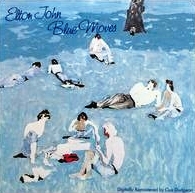
- Format: FLAC

The immense creativity that had spurred Elton John to realize no less than 11 studio albums in under seven years was beginning to show signs of inevitable fatigue. The same can be said as well of the artist's unfathomable physical stamina, which had included practically nonstop touring around the globe since the early '70s. Although initially Blue Moves (1976) was summarily dismissed by both critics as well as longtime enthusiasts, the double LP has since gained considerable stature within John's voluminous catalog. While comparisons were inevitable to the landmark two-disc Goodbye Yellow Brick Road (1973) song cycle, most similarities in musical style and content end there. John's band had expanded to include the talents of James Newton Howard (keyboards/orchestral arrangements), Kenny Passarelli (bass), Roger Pope (drums), and Caleb Quaye (guitar) -- the latter pairing had actually performed with John as far back as his first long-player, Empty Sky (1968) -- as well as Davey Johnstone (guitar) and Ray Cooper (percussion) from the "classic" early-to-mid-'70s lineup. As the title suggests, Blue Moves is a departure from the heavier Rock of the Westies (1975). Instead, the album purposefully focuses on moodier and more introspective sides -- such as the single "Sorry Seems to Be the Hardest Word" (the effort's sole hit), the achingly poignant "Tonight," and "Cage the Songbird," the latter of which is particularly noteworthy as it recalls the life of Edith Piaf in much the same way that "Candle in the Wind" had immortalized Marilyn Monroe. "One Horse Town," which John briefly revived as a dramatic show opener during late-'80s live performances, is one of Blue Moves' most powerful and straight-ahead rockers. The lively string arrangement by Howard stands as one of the finest contributions to his short-lived tenure in this band, which for all intents and purposes dismantled after the album was recorded in March of 1976. Other standouts include the full-tilt gospel vibe of "Boogie Pilgrim" -- which features backing vocals from both the Cornerstone Institutional Baptist and the Southern California choirs under the direction of Rev. James Cleveland -- "Crazy Water," the haunting ballad "Idol," as well as the set's closing R&B vamp, "Bite Your Lip (Get Up and Dance!)." While Blue Moves is a far cry from essential entries such as Tumbleweed Connection (1971) or Captain Fantastic and the Brown Dirt Cowboys (1975), the bright moments prove that John could still offer up more than average material. It is also worth mentioning that this effort marked the end of John's initial collaboration with lyricist Bernie Taupin, who would resurface some three years later, albeit haphazardly on 21 at 33 (1979).